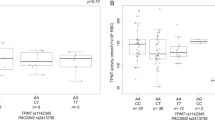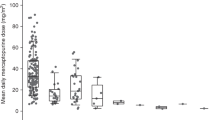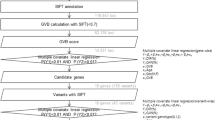Abstract
Thiopurines are used in the treatment of inflammatory bowel disease (IBD) but remain clinically challenging to manage due to wide interpatient variability in clinical outcomes and adverse events. Apart from genetic variants in thiopurine S-methyltransferase (TPMT) and nudix hydrolase 15 (NUDT15) genes, polymorphisms in FTO alpha-ketoglutarate dependent dioxygenase (FTO) were found predictive of thiopurine-induced leukopenia, albeit with conflicting results. To clarify the role of FTO variants in a multiethnic Asian IBD cohort, we recruited 149 patients on thiopurine-based therapy and genotyped two FTO variants p.Ala134Thr (rs79206939) and rs16952570 T > C using Sanger sequencing. FTO p.Ala134Thr (rs79206939) was non-polymorphic and absent whereas intronic rs16952570 T > C was equally prevalent in Chinese (22%) and Indians (18%) and higher in Malays (28%). Higher nadir white blood cell (WBC) and absolute neutrophil count (ANC) levels were observed in patients harboring FTO rs16952570 CC genotypes compared with TT carriers at 4, 8, and 12 weeks after start of thiopurine therapy (P < 0.05). A similar trend was observed in patients carrying the previously well-characterized NUDT15 rs116855232 wild-type CC genotypes. Further in silico analysis suggests that FTO variants linked to rs16952570, particularly rs74018601, may play a regulatory role in altering the FTO expression. The findings from this study indicate a novel protective association with the FTO variant rs16952570 CC genotype and hematological parameters.
This is a preview of subscription content, access via your institution
Access options
Subscribe to this journal
Receive 6 print issues and online access
$259.00 per year
only $43.17 per issue
Buy this article
- Purchase on Springer Link
- Instant access to full article PDF
Prices may be subject to local taxes which are calculated during checkout



Similar content being viewed by others


References
Kim JH, Cheon JH, Hong SS, Eun CS, Byeon J-S, Hong SY, et al. Influences of thiopurine methyltransferase genotype and activity on thiopurine-induced leukopenia in Korean patients with inflammatory bowel disease: a retrospective cohort study. J Clin Gastroenterol. 2010;44:e242–8.
Takatsu N, Matsui T, Murakami Y, Ishihara H, Hisabe T, Nagahama T, et al. Adverse reactions to azathioprine cannot be predicted by thiopurine S-methyltransferase genotype in Japanese patients with inflammatory bowel disease. J Gastroenterol Hepatol. 2009;24:1258–64.
Lee HJ, Yang S-K, Kim K-J, Choe J-W, Yoon SM, Ye BD, et al. The safety and efficacy of azathioprine and 6-mercaptopurine in the treatment of Korean patients with Crohn’s disease. Intest Res. 2009;7:22–31.
Nielsen OH, Vainer B, Rask-Madsen J. The treatment of inflammatory bowel disease with 6-mercaptopurine or azathioprine. Aliment Pharmacol Ther. 2001;15:1699–708.
Collie-Duguid ES, Pritchard SC, Powrie RH, Sludden J, Collier DA, Li T, et al. The frequency and distribution of thiopurine methyltransferase alleles in Caucasian and Asian populations. Pharmacogenetics. 1999;9:37–42.
Kham SKY, Soh CK, Liu TC, Chan YH, Ariffin H, Tan PL, et al. Thiopurine S-methyltransferase activity in three major Asian populations: a population-based study in Singapore. Eur J Clin Pharm. 2008;64:373–9.
Sutiman N, Chen S, Ling KL, Chuah SW, Leong WF, Nadiger V, et al. Predictive role of NUDT15 variants on thiopurine-induced myelotoxicity in Asian inflammatory bowel disease patients. Pharmacogenomics. 2018;19:31–43.
Yang S-K, Hong M, Baek J, Choi H, Zhao W, Jung Y, et al. A common missense variant in NUDT15 confers susceptibility to thiopurine-induced leukopenia. Nat Genet. 2014;46:1017–20.
Moriyama T, Nishii R, Perez-Andreu V, Yang W, Klussmann FA, Zhao X, et al. NUDT15 polymorphisms alter thiopurine metabolism and hematopoietic toxicity. Nat Genet. 2016;48:367–73.
Kakuta Y, Naito T, Onodera M, Kuroha M, Kimura T, Shiga H, et al. NUDT15 R139C causes thiopurine-induced early severe hair loss and leukopenia in Japanese patients with IBD. Pharmacogenomics J. 2016;16:280–5.
Sato T, Takagawa T, Kakuta Y, Nishio A, Kawai M, Kamikozuru K, et al. NUDT15, FTO, and RUNX1 genetic variants and thiopurine intolerance among Japanese patients with inflammatory bowel diseases. Intest Res. 2017;15:328–37.
Zhang AL, Yang J, Wang H, Lu JL, Tang S, Zhang XJ. Association of NUDT15 c.415C>T allele and thiopurine-induced leukocytopenia in Asians: a systematic review and meta-analysis. Ir J Med Sci. 2018;187:145–53.
Kim HS, Cheon JH, Jung ES, Park J, Aum S, Park SJ, et al. A coding variant in FTO confers susceptibility to thiopurine-induced leukopenia in East Asian patients with IBD. Gut. 2016;gutjnl-2016-311921.
Ward LD, Kellis M. HaploReg: a resource for exploring chromatin states, conservation, and regulatory motif alterations within sets of genetically linked variants. Nucleic Acids Res. 2012;40:D930-4.
Lonsdale J, Thomas J, Salvatore M, Phillips R, Lo E, Shad S, et al. The genotype-tissue expression (GTEx) project. Nat Genet. 2013;45:580–5.
Fawcett KA, Barroso I. The genetics of obesity: FTO leads the way. Trends Genet. 2010;26:266–74.
Cecil JE, Tavendale R, Watt P, Hetherington MM, Palmer CNA. An obesity-associated FTO gene variant and increased energy intake in children. N. Engl J Med. 2008;359:2558–66.
Jia G, Fu Y, Zhao X, Dai Q, Zheng G, Yang Y, et al. N6-methyladenosine in nuclear RNA is a major substrate of the obesity-associated FTO. Nat Chem Biol. 2011;7:885–7.
Jia G, Yang C-G, Yang S, Jian X, Yi C, Zhou Z, et al. Oxidative demethylation of 3-methylthymine and 3-methyluracil in single-stranded DNA and RNA by mouse and human FTO. FEBS Lett. 2008;582:3313–9.
Gerken T, Girard CA, Tung Y-CL, Webby CJ, Saudek V, Hewitson KS, et al. The obesity-associated FTO gene encodes a 2-oxoglutarate-dependent nucleic acid demethylase. Science. 2007;318:1469–72.
Wei J, Liu F, Lu Z, Fei Q, Ai Y, He PC, et al. Differential m6A, m6Am, and m1A demethylation mediated by FTO in the cell nucleus and cytoplasm. Mol Cell. 2018;71:973–85.e5.
Bartosovic M, Molares HC, Gregorova P, Hrossova D, Kudla G, Vanacova S. N6-methyladenosine demethylase FTO targets pre-mRNAs and regulates alternative splicing and 3’-end processing. Nucleic Acids Res. 2017;45:11356–70.
Li H, Ren Y, Mao K, Hua F, Yang Y, Wei N, et al. FTO is involved in Alzheimer’s disease by targeting TSC1-mTOR-Tau signaling. Biochem Biophys Res Commun. 2018;498:234–9.
Franczak A, Kolačkov K, Jawiarczyk-Przybyłowska A, Bolanowski M. Association between FTO gene polymorphisms and HDL cholesterol concentration may cause higher risk of cardiovascular disease in patients with acromegaly. Pituitary. 2018;21:10–5.
van Asseldonk DP, Seinen ML, de Boer NKH, van Bodegraven AA, Mulder CJ. Hepatotoxicity associated with 6-methyl mercaptopurine formation during azathioprine and 6-mercaptopurine therapy does not occur on the short-term during 6-thioguanine therapy in IBD treatment. J Crohns Colitis. 2012;6:95–101.
Lim SZ, Chua EW. Revisiting the role of thiopurines in inflammatory bowel disease through pharmacogenomics and use of novel methods for therapeutic drug monitoring. Front Pharm. 2018;9:1107.
Zhang X, Wei L-H, Wang Y, Xiao Y, Liu J, Zhang W, et al. Structural insights into FTO’s catalytic mechanism for the demethylation of multiple RNA substrates. Proc Natl Acad Sci. 2019;116:2919–24.
Merkestein M, McTaggart JS, Lee S, Kramer HB, McMurray F, Lafond M, et al. Changes in gene expression associated with FTO overexpression in mice. PLOS ONE. 2014;9:e97162.
Gerbek T, Ebbesen M, Nersting J, Frandsen TL, Appell ML, Schmiegelow K. Role of TPMT and ITPA variants in mercaptopurine disposition. Cancer Chemother Pharmacol. 2018;81:579–86.
Chadli Z, Kerkeni E, Hannachi I, Chouchene S, Ben Fredj N, Boughattas NA, et al. Distribution of genetic polymorphisms of genes implicated in thiopurine drugs metabolism. Ther Drug Monit. 2018;40:655–9.
Matimba A, Li F, Livshits A, Cartwright CS, Scully S, Fridley BL, et al. Thiopurine pharmacogenomics: association of SNPs with clinical response and functional validation of candidate genes. Pharmacogenomics. 2014;15:433–47.
Acknowledgements
The authors would like to thank all study participants and the research coordinators from the Singapore General Hospital and Tan Tock Seng Hospital for their contributions.
Author information
Authors and Affiliations
Corresponding author
Ethics declarations
Conflict of interest
The authors declare that they have no conflict of interest.
Additional information
Publisher’s note Springer Nature remains neutral with regard to jurisdictional claims in published maps and institutional affiliations.
Supplementary information
Rights and permissions
About this article
Cite this article
Chen, S., Tan, W.Z., Sutiman, N. et al. An intronic FTO variant rs16952570 confers protection against thiopurine-induced myelotoxicities in multiethnic Asian IBD patients. Pharmacogenomics J 20, 505–515 (2020). https://doi.org/10.1038/s41397-019-0126-9
Received:
Revised:
Accepted:
Published:
Issue Date:
DOI: https://doi.org/10.1038/s41397-019-0126-9
This article is cited by
-
A review article of inflammatory bowel disease treatment and pharmacogenomics
Beni-Suef University Journal of Basic and Applied Sciences (2023)
-
Evaluation of FTO polymorphism in 6-mercaptopurine related intolerance in children with acute lymphoblastic leukemia
Cancer Chemotherapy and Pharmacology (2023)

